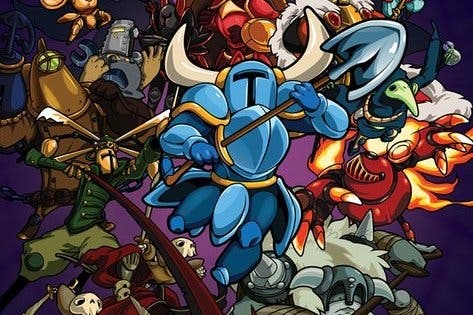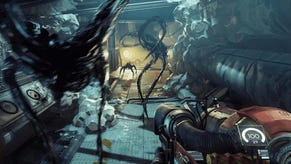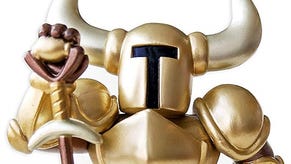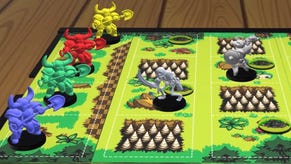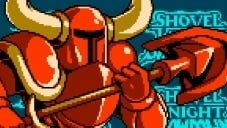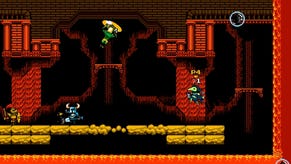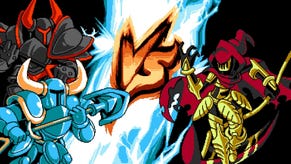Shovel Knight review
The ace of spades.
In one memorable exchange in the most recent TV series of Game of Thrones, the brutish warrior known as the Hound suggests that the only people who bother to name their swords are "c***s". But we video game players usually leave our weapons nameless not through virtue but through a plain lack of resources: there aren't enough names in the world to bestow on the endless supply of swords and guns that pass through our virtual palms. (The Master Swords and Klobbs of our world have to be uniquely good, terrible or recurrent before a christening.)
With so much combat going on in video games, designers turn not to names but to unusual objects to make their arsenals stand out. There's Phantasy Star Online's frying pan, Perfect Dark's laptop gun, Kingdom Heart's massive key bludgeon, Saints Row 4's dubstep gun and Bayonetta's weaponised hairdo. Dead Rising is a series of games that revolves not around zombies so much as unlikely weaponry. I'm not sure if a video game protagonist has wielded a spade before, but they've certainly never named themselves after one.
Shovel Knight wields the spade like it was a sword. It would be a purely cosmetic affect were it not for the fact that, every now and again, he uses it to dig up treasure from the mole-hill earth deposits left around the game's stages, or to knock padlocks from treasure chests. It also provides a useful downward attack whereby the diminutive knight stands on the shovel's blade and bounces on the ground as if using a pogo-stick. Elsewhere, however, this is a routine, if pleasingly brisk and easy-going, tribute to the action platform games of the Super Nintendo era: a period piece with few features beyond its widescreen aspect ratio that betray its contemporary development.

The service to tradition begins on the game's olde-world map, which is laid out as a series of Super Mario World-esque nodes. Some of these nodes represent new stages, which must be cleared in order to unlock new pathways on the map. Others are villages where you can upgrade Shovel Knight's health bar, increase the amount of magical spells he can cast or chat to the population. Still others are small dioramas with a puzzle waiting to be solved or an antagonistic stranger who will give up some gold or items if bested in combat.
Enter a stage and the camera shifts to a side-on perspective. Rather than Mario's smooth tracking camera, Shovel Knight's environments are presented in discrete screens. Touch the edge of the screen and the next area in sequence flits into view. It's an antiquated design but one that allows the developer Yacht Club Games to make each screen a discrete spatial puzzle in which you must figure out how to negotiate the arrangement of boxes and ladders in order to move forward.
At first these prove enjoyable, but during the latter stages of the game, as the designers make each series of jumps and actions more prescribed and more difficult, it loses some appeal. This mild problem is exacerbated by some unnecessarily punitive design elements, such as spikes that instantly empty your health bar, leaving a percentage of your collected gold hovering around your point of death, ready for collection during your next attempt.

The interactions themselves also feel ever so slightly off. You don't jump upwards in an arc when leaping from ladders, for example; instead you trip down from their side, which feels unintuitive, particularly in the underwater stage where movement is necessarily slow and treacly. Shovel Knight soon comes across some ability-enhancing relics - projectile fireballs and the like - but the feel of the character's movement is ever so slightly too slow and the level layouts struggle to match the strongest examples of the era that the game so eagerly draws upon.
There is, however, much here that delights. The enemies vary in interesting ways: pincer-clicking stag beetles, tickling sea creatures whose shells can be kicked around the screen to unblock secret areas, skeletal knights that raise their shields above their heads to prevent you stomping on them from above. Each main stage concludes with a dramatic boss battle, and these are the game's standout moments both in terms of character and game design. There's the knight who fights while wearing a Victorian diving suit, the giant deep-sea angler fish that has a treasure chest in place of a bright light on the tip of its tentacle, or the shopkeeper whose attacks change depending on which hat he is wearing. Each boss has patterns that must be learned and, until you upgrade your health bar (using the jewels and coins you dig up or smash from blocks), every encounter is perilous.

In the latter half of the game you discover a village where blacksmiths will forge you fresh armour (which, for example, enables you to drop half as much gold when you fall in battle or to keep your footing when struck by enemies) and upgrade your shovel to perform new actions. Yacht Club Games introduces variety through auto-scrolling stages, too, in which you must make precise leaps and swipes in order to keep ahead of the inexorable advance of the screen. Finally, later stages include set-piece puzzles where, for example, you must use enemy blobs to temporarily turn spouts of fire into platforms that can be stood upon. The variety continues to entertain across the eight hours or so of the storyline, washed down with good humour in both the game's dialogue and its sprightly animations.
If the continuing appropriation of 2D pixel-art sprites and game styles from yesteryear was nothing more than an exercise in aesthetic nostalgia, then Shovel Knight would be difficult to recommend. But the game offers another demonstration of the enduring power and appeal of this form of play - even if it was forged within a set of technical boundaries that are no longer relevant. The game has a light, fresh appeal, even for those who never played 16-bit platform games the first time around, skewering the old publisher lie that only the latest, loudest, most technologically accomplished video games are worthwhile. There is gold in these old genres, and Shovel Knight is a successful dig.
